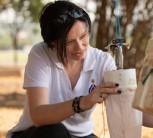Dr Taneshka Kruger has been doing research at the University of Pretoria (UP) since 2012, which was when she did her postdoctoral fellowship on an innovative malaria mosquito vector control method. She joined the UP Institute for Sustainable Malaria Control (ISMC) as project manager and coordinator in the same year. Dr Kruger is also responsible for marketing the institute, and her research focus contributes to this.
Her research focus is innovative and novel malaria education and health promotion as proactive malaria transmission prevention methods and strategies. A large proportion of malaria deaths occur annually in children under five years of age. Dr Kruger’s research and communication initiatives often have her working directly with malaria-endemic communities, especially with young children of primary school age, in the rural Vhembe District in northeast Limpopo. The aim is to raise malaria awareness and to teach children how to prevent contracting the disease.
Malaria is still a major public health concern, with hundreds of thousands of people dying annually from the disease, despite it being both preventable and treatable. Dr Kruger says her research matters because it contributes towards proactive malaria prevention strategies, specifically identifying novel education and health promotion interventions that have the potential to contribute towards malaria elimination.
Dr Kruger is part of a cross-faculty research team at UP. In her capacity as project manager and coordinator at the UP ISMC, she works with a variety of researchers that specialise in many interesting fields and with a focus on malaria elimination. She recently collaborated with Dr Megan Riddin – of UP’s School of Health Systems and Public Health, and medical entomologist at UP ISMC – on mosquito vector biology and innovative control; Professor Walter Focke, of the Department of Chemical Engineering, on innovative malaria/mosquito repellents and control methods; and Prof Irma Eloff, of the Department of Education Psychology, on the use of culturally and age-appropriate songs to educate children about malaria.
A recent research highlight for her was determining the most effective malaria intervention education method in primary schools. This research will be expanded further in the following year.
Dr Kruger regards Prof Riana Bornman, senior research professor in the School of Health Systems and Public Health, as an inspiration because she is so devoted to what she does, which includes working with rural malaria-endemic communities. Dr Kruger adds that Prof Tiaan de Jager, director of the UP ISMC and Dean of the Faculty of Health Sciences, is her academic role model because of his vision to establish the transdisciplinary research entity that has brought together researchers from various disciplines working towards the elimination of malaria.
Her advice to school learners or undergraduates who are interested in her field is to identify the one thing about this field, or any research field, that generates excitement for them, because that makes the hard work and challenges worth the while. She adds that by focusing on the one thing that brings joy, the rest will fall in place.
In her spare time, Dr Kruger enjoys scuba diving.
More from this Researcher

 Story
Story
 Story
Story
 Infographic
Infographic
Get Social With Us
Download the UP Mobile App